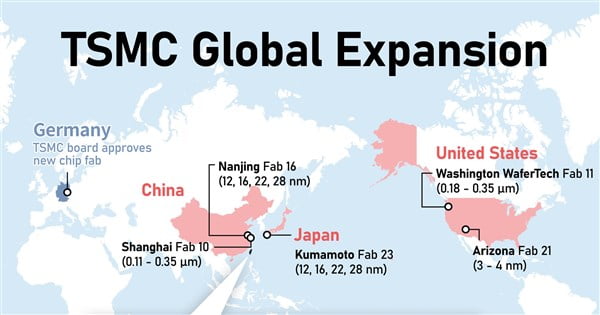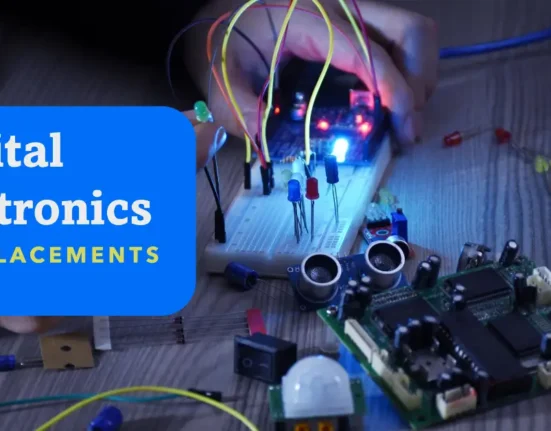TSMC global expansion planning: Taiwan Semiconductor Manufacturing Company, the world’s largest contract chipmaker, has announced that it will open its new fab in Japan on February 24, while its planned facility in the United States will face further setbacks. The company, which supplies chips to major tech firms such as Apple and Nvidia, has been expanding its global presence amid rising demand and geopolitical tensions.

TSMC’s Global Footprint
The Japan fab, located in Kumamoto, will produce chips using 12-, 16-, 28- and 22-nanometre process technology, according to TSMC Chairman Mark Liu. The fab will start mass production in the fourth quarter of 2024 and will mainly serve customers in the automotive and industrial sectors. Liu said that the Japan fab was built with the support of the Japanese government, which has allocated $13 billion to boost its domestic semiconductor industry and generative AI technology.
TSMC Global Expansion: Japan Fab Opening Amid Rising Demand
The Japan fab is part of TSMC global expansion strategy to diversify its manufacturing base and increase its customer trust in a “fractured globalisation environment”, Liu said. The company also has plans to build another fab in Japan, but that project is still under evaluation and negotiation with the Japanese authorities. “Nothing is definitive,” Liu said.
Meanwhile, TSMC’s US fab, which was announced in May 2020 as a response to Washington’s pressure to reduce its reliance on foreign chipmakers, has encountered some challenges. The fab, which will be located in Arizona and will use 5-nanometre process technology, was originally scheduled to start production in 2024. However, Liu said that the timeline might be delayed due to “uncertainties” such as supply chain issues, environmental regulations and labour availability.

TSMC global expansion comes at a time when the semiconductor industry is facing a severe shortage of chips, which has affected various sectors such as consumer electronics, automotive and healthcare. The shortage has also sparked a fierce competition among countries to secure chip supplies and attract chipmakers to invest in their markets. TSMC, as the dominant player in the market, has been courted by many governments, including the US, Japan, Germany and India.
However, TSMC global expansion has also faced some risks and challenges in its overseas ventures. One of them is the rising cost of building and operating fabs outside Taiwan, where the company enjoys lower electricity prices, tax incentives and a skilled workforce. Another challenge is the potential impact of geopolitical conflicts on its business operations, especially the ongoing dispute between the US and China over trade, technology and Taiwan’s status. TSMC has tried to balance its relations with both sides, but it may face more pressure and scrutiny in the future.
TSMC, the world’s largest contract chipmaker, announced on Thursday that it will start mass production of its advanced 4-nanometre chips in Arizona by mid-2025, but warned that its second plant in the state will face delays.
The company’s chairman Mark Liu said in a conference call with analysts that the construction of its first Arizona fab, which will use its N4 technology, is “on track” and will begin volume production in the first half of 2025.
However, he added that the second fab, which will use its N3 technology, will be postponed until “2027 or 2028” due to challenges in hiring and training local talent.
This is a blow to the US government and also a hurdle in TSMC global expansion, which has been courting TSMC and other chipmakers to build more factories in the US to reduce its dependence on foreign suppliers amid a global chip shortage and rising geopolitical tensions.
The Arizona project, which is one of the largest foreign investments in the US, has also faced criticism from local unions, who accused TSMC of undermining labor standards and wages.

Liu said TSMC is committed to “develop strong relationships with our local union and trade partners in Arizona” and has signed an agreement on various issues, including training, hiring and communication.He also said TSMC is making progress on its planned fab in Germany, which will be its first in Europe. He said the construction will start in the fourth quarter of this year and the fab will use its N5 technology. TSMC also reported its fourth-quarter earnings on Thursday, showing a 19.3 percent decline in net profit to Tw$238.7 billion ($7.6 billion), while its revenue was “essentially flatt”.
CEO C.C. Wei said 2023 will be a “challenging year” for the chip industry due to high inflation and slowing global growth, but he expressed optimism for 2024, citing the rising demand for generative AI technology. He said TSMC is well-positioned to capture the opportunities from AI applications, such as ChatGPT, which require high-performance chips to power their natural language processing capabilities.
CEO C.C. Wei
Discover more from WireUnwired
Subscribe to get the latest posts sent to your email.




